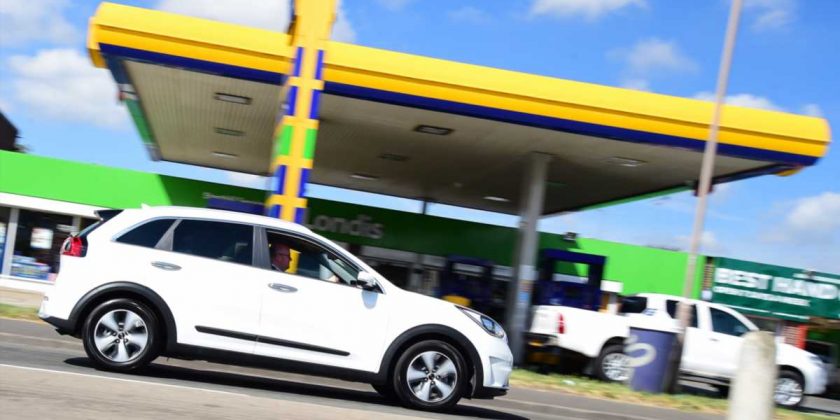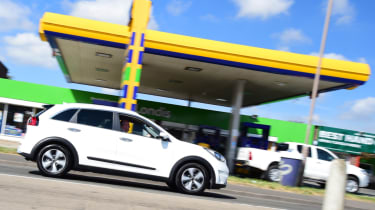Petrol and diesel prices remained steady in September, but experts say drivers are still paying more than they should be
Three months of rising fuel prices came to an end in September, with petrol and diesel pump prices remaining broadly stable.
Petrol reduced 0.17p on average to 114.61p per litre, while diesel fell from 118.43p to 118.10p per litre average. At the ‘big four’ supermarkets – ASDA, Morrisons, Sainsbury’s and Tesco – petrol and diesel remained at 109p and 114p per litre respectively. Meanwhile, motorway petrol prices went up 2.57p to 126.72p per litre on average, while diesel rose 1.83p to 131.14p per litre.
E10 petrol to be UK standard by 2021, but won’t work in older cars
According to the figures from RAC Fuel Watch, it now costs £63 to fill an average 55-litre family car with petrol and £65 with diesel. The wholesale price of diesel, however, has been lower than that of petrol for the last six weeks, so diesel drivers are paying more than they should be.
Unleaded, meanwhile, is now 9p per litre more than the low of 105.81p it reached on 21 May, but prices are still a lot lower than they were in January, when petrol was 128p per litre on average and diesel was 132p.
Northern Ireland remains the cheapest region in the UK to buy petrol and diesel, at 111.31p and 114.25p per litre respectively. London is the most expensive place to buy petrol at 115.82p per litre, while south-east England has the highest average diesel pump price at 119.53p per litre.
RAC fuel spokesman Simon Williams said: “After three months of rising fuel prices, drivers will be relieved to see the cost of both petrol and diesel staying the same. Since June, when prices stopped falling as a result of the coronavirus movement restrictions being eased, the cost of fuel has been going up steadily. While price rises are never good news, they have not gone back to the high levels seen at the beginning of the year.”
He added: “Diesel drivers should feel short-changed by the decision of retailers to keep prices artificially high. The price of a litre is currently 8p higher than it should be due to reductions in the wholesale price. In fact, the wholesale price of diesel has now been lower than the petrol equivalent for six weeks, yet petrol continues to be sold for 3.5p less than diesel. This must surely be difficult for retailers to justify. We strongly urge them to lower their prices in an effort to restore drivers’ trust.
What makes up the price of UK fuel?
The price of fuel can be divided into three sections; the taxes imposed by the Government, the costs of drilling, refining and transporting, and the profit margins for the fuel companies.
For petrol, diesel and bioethanols, the Government gets around 65 per cent of the overall cost through fuel duty and value added tax (VAT). The fuel duty represents the fixed price of fuel – it stays the same regardless how much overall oil prices fluctuate. Currently, the Treasury adds 57.95 pence to each litre of fuel through fuel duty, and another 20 per cent through VAT. How much you pay in VAT depends on how much fuel you purchase.
The second biggest chunk comes from the wholesale costs of the fuel itself. The wholesale cost is a combination of currency exchange rates, global oil prices, and even domestic supply and demand.
New 450kW EV charger from BMW and Porsche is as fast as filling up with petrol
Finally, the smallest share of what motorists have to pay for fuel comes from the filling stations themselves. A typical fuel station profits around 2p-5p per litre, but tough competition can drive this down further. Supermarkets increasingly use fuel prices as a loss leader to tempt customers in.
Why is supermarket fuel cheaper than an independent forecourt?
Supermarket forecourts usually offer the cheapest fuel prices and this is because of the market power supermarkets hold. Companies like Asda, Tesco, Sainsbury’s and Morrisons are all in competition with one another, so they keep fuel prices as low as possible hoping that when motorists come to fill their tank, they might do their weekly grocery shopping, too.
There are persistent rumours that supermarket fuel contains fewer additives and is of lesser quality than fuel from traditional forecourts, but there’s little hard evidence of this. All fuel sold in the UK has to abide by the standards set in the Motor Fuel Regulation.
Why is fuel so expensive on motorways?
Motorway fuel stations argue the reason their prices are higher is that many of them are open 24 hours a day and offer more services than a regular forecourt. Motorway fuel stations also pay high rent prices for the buildings they operate.
In more remote areas, fuel is often more expensive because of the higher transport and supply costs, but according to RAC fuel spokesman Simon Williams, this doesn’t apply to motorway stations: “We can see no reason why motorway fuel should be so much more expensive. In fact, arguably it is much easier from a delivery point of view than it is getting fuel to urban filling stations.”
Why is diesel more expensive than petrol?
Although diesel and petrol are taxed the same by the Treasury, historically diesel has been more expensive than petrol, as domestic refineries have struggled to meet demand. This has forced the UK to import diesel from other countries at a greater rate than petrol. In addition, diesel prices are pushed up by the cost of the additives that go into the fuel.
Best diesel cars 2020
Furthermore, the gap between UK petrol and diesel prices widens during the winter. The end of the US “driving season” means retailers have a surplus of petrol they can’t export, so they sell it here at a lower price. Diesel demand, meanwhile, increases across continental Europe, where the fuel is commonly used in heating oil.
However, the influx of cheap diesel from countries like Saudi Arabia has turned the tide, swinging diesel wholesale prices closer to that of petrol, and bringing the pump price down with it.
What’s your view on fuel prices in the UK? Do we pay too much for our petrol and diesel? What would you do about it? Join the debate in our comments section below…
Source: Read Full Article



 E10 petrol to be UK standard by 2021, but won’t work in older cars
E10 petrol to be UK standard by 2021, but won’t work in older cars New 450kW EV charger from BMW and Porsche is as fast as filling up with petrol
New 450kW EV charger from BMW and Porsche is as fast as filling up with petrol Best diesel cars 2020
Best diesel cars 2020